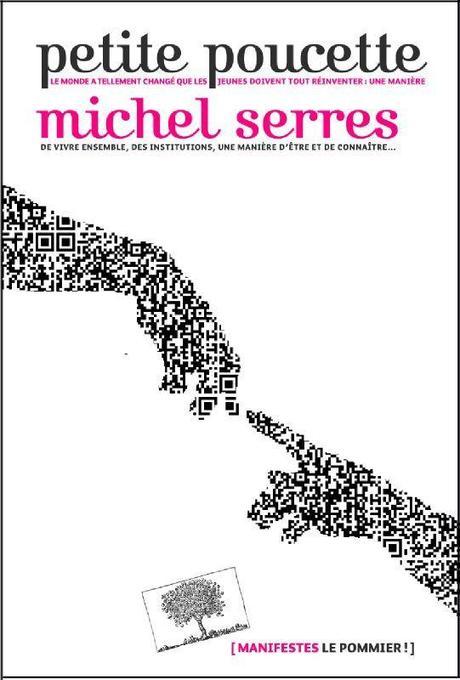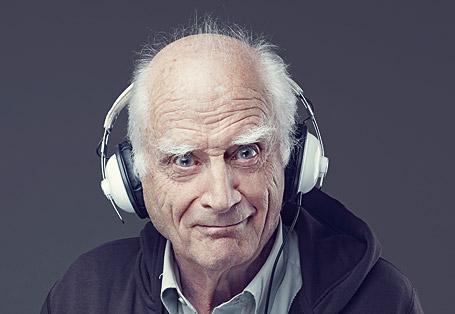 Petite Poucette, by Michel Serres. Editions Le Pommier 2012.
Petite Poucette, by Michel Serres. Editions Le Pommier 2012.
Saint Denis was beheaded on the hill looming over northern Paris now known as Montmartre. The legend is that he picked up his own head and carried it several miles north, before finally collapsing and expiring on the site of the present day suburb that bears his name.
It’s to Saint Denis that Michel Serres compares future generations of human beings in this remarkable little book (barely 90 pages long). Petite Poucette (“little thumb”) is his female avatar for today’s young people who, with their dextrous digits, carry their heads — their knowledge — on laptops, mobiles and tablets. This is changing everything, not just the way we learn, do business and enjoy ourselves. It’s changing human nature itself, and just as importantly, the way we live together.
I’ve been a Serres fan since writing about him in my very first blog three years ago. His reasoning is razor-sharp, and he writes with the radical clarity of someone very young and the wisdom of someone very old. Yes, he’s 83, French, and professor of something very intellectual at Stanford. But he’s no grumpy old don whingeing about porn-addicted kids with minuscule attention spans and the world going to hell in an online shopping cart. Believe it or not, Serres is optimistic about the future.
You might think only a conservative could be optimistic at the moment, but Serres reckons that if the powers that be aren’t trembling yet, it’s only because they don’t understand what’s hit them. “I see our institutions shining with a brightness similar to that of constellations that astronomers tells us have been dead for a long time,” he says.
With knowledge freed, existing power structures will crumble. It starts, says Serres, with education.
Why sit listening to a tired teacher reading “approved” excerpts from a book, when the whole book is out there, freely accessible from anywhere, at any time? Why accept the established interpretations when you can read and discuss the comments of thousands if not millions of people who’ve read it and thought about it?
Why sit with your ‘arse parked’ in serried ranks, when you can sit in the park, on the beach, in the pub? Why listen to this single narrow conduit of knowledge and power (the teacher at the lectern) when the whole world of knowledge is there in your hands? And why bother learning facts when you can bring them up under your thumb? The minds of Petite Poucette will be free to think and have ideas instead of being clogged up with remembering second-hand information.
This, says Serres, is the true birth of the individual. ‘Grumpy adults’ may see this as “selfish”, but weigh that egotism against where the “libido of affiliation” has got us in the last 100 years. In the name of abstract collectives like the nation, race and religion, hundreds of millions have died. Individuals rarely ask this of each other. And no one was ever asked to die for a virtual community.

“To no longer build a community on the massacre of another or of oneself — this is our future life set against your history and your politics of death,” replies Petite Poucette.
And are the virtual communities young people have created any less “real” than the ones we have been taught to value? ’We adults have succeeded in creating no new social connections,’ says Serres. The “community”, the nation, the church, school, family, class, the market — where do they stand today? To Petite Poucette, they are just ‘abstractions flying overhead like cardboard mascots’.
Are the British and French “nations” any more “real” than a Facebook group? Do we “belong” to a social class, or the company we work for, more than the online communities we choose to join?
For thousands of years, from the pyramid of Cheops to the Eiffel Tower, the ‘global form’ of human society has been broad at the bottom and narrow at the top, with power, wealth and the control of knowledge concentrated in a few hands. New technology is set to change that, perhaps within a generation, says Serres. The real revolutionaries are not the inventors of this technology, but the users. They will turn the world upside down.
It’s a striking view of the future, both optimistic and disturbing at the same time. But unlike the zombie ideology of free market capitalism, young people don’t have to sit back and take it. It’s something that they can shape for themselves. Serres has no fear. ‘I like to be 18 years old,’ he says, ‘because everything is to be remade, everything is left to re-invent.’
